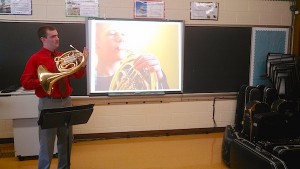Overcoming the challenges of finding your first music teaching job requires patience, knowledge, and support. Some of the biggest hurdles include:
- How to prepare for the job hunt?
- What to do to set yourself apart from the competition?
- How to show school administrators that you are the right candidate for their school?
- How to address your lack of experience?
by Kevin Brady
Challenges + Solutions
1. Many music teachers are specialized in one area or another (band, chorus, strings). More and more often, however, they are expected to teach outside their area of specialization, or teach multiple areas.
Solution: Practice teaching outside your specialization as much as you can. This way, you will feel more comfortable with any assignment a district might request.
2. Many music teachers have few – if any – music colleagues at their schools.
Solution: Stay active in national, state and local music educators associations to make connections with other music teachers, as well as to share and gain new ideas to continually improve your teaching skills. Membership in these organizations can help compensate for the lack of colleagues at the school level.
3. Many job postings indicate that prior teaching experience is required, leaving young teachers asking the question “How am I supposed to gain job experience if I need experience to get a job?
Solution: Take advantage of any opportunity you can find to work with young people. Volunteering and working at summer camps or after-school programs, for example, are less likely to require teaching experience.
4. Some areas of the country have a greater need for teachers. This may require you to relocate.
Solution: If teaching music is truly your passion, don’t be afraid to follow opportunities to new places or even other states.
What Young, Employed Teachers Wish They’d Known
School districts post their jobs in many different ways, so it’s important to know that hunting for a public school music teaching job is a very time-consuming process. You may find jobs on websites like indeed.com, but some schools post jobs through regional online systems, and some only post on their district’s own website.
Take every opportunity you can to interview. This way, you will have had lots of practice answering interview questions in a real situation. When you get the interview for your dream job, you’ll be better prepared.
What do administrators look for in a potential music teacher?
Confidence
Learn to make a good first impression and practice your interviewing skills. Make eye contact, know how to answer questions you expect to be asked. Practice answering typical interview questions, but make sure they don’t sound rehearsed.
Flexibility and nimbleness
Be able to think on your feet and don’t be afraid to make changes to your plan.
Attentiveness
Show that you are someone who will be aware of what is going on in your classroom, what works for your students, and what their needs are.
Proactive approach
Present yourself as someone who will seek out opportunities to create the best experience you can for your students.
It is important to note that some of these traits and behaviors can only be seen in action. If asked to do a demo lesson, you’ll have a chance to demonstrate these qualities at that time. It can also be helpful to put together a digital portfolio that includes videos of you teaching, conducting, and even performing. This is another opportunity to show how well you work with students, how you work with ensembles, that you care about performing music, and that you’re an excellent musician.
Words of Wisdom for New Teachers
1. Take every opportunity you can to observe great teaching. Keep a list of techniques, ideas and qualities you want to use or embody someday.
2. Watch other directors’ rehearsals, but before the rehearsal, try studying the score. Imagine what you would do and how you would approach the pieces. Then compare that to what the director actually does.
3. Music teaching is a difficult profession since many school districts see music teachers and music education as a luxury. If music is your passion, fight for it!
4. There are definitely jobs out there, but you need to be persistent. No district is going to knock on your door and ask you to teach for them. You need to prove to them why you are the perfect fit for their district.
Kevin Brady is the Elementary Band Director in the Cave Creek Unified School District, Cave Creek, AZ. A 2014 graduate of the Crane School of Music, he studied Music Education and Music Business, completing a student teaching assignment in Mount Sinai, NY and a marketing internship at DANSR, Inc., the U.S. distributor for Vandoren and Denis Wick Music Products in Chicago, IL.
Photo credit: Robert Moriarty



Anne
Great article! Also – Describe and have a vision for your classroom culture and climate. Brainstorm how your day to day routines will take place and how you want your students to interact in the room. Brainstorm class norms with your students and have them create ownership in the class.
Marvin
Good day. I find your advice useful. Thanks.
Denise
Couldn’t agree more! Well done Mr. Brady! Also hope that given what colleges and universities charge these days for a degree that they would do more to assist their students with resume preparation, interviewing skills, placement, etc. Best of luck to all graduates out there!